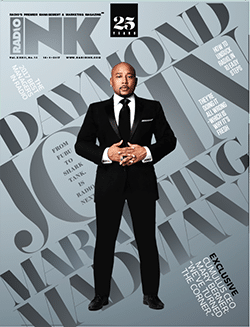
By Editor-in-Chief Ed Ryan
Daymond John, now best known as part of ABC’s Shark Tank, burst into public awareness in the early ’90s, when he launched the FUBU clothing line. But, as with most “overnight” successes, it took some time: John admits that he “failed a bunch of times” before he had the idea to start selling hats and T-shirts with some friends. And when the potential for his ideas became clear, he took out a loan and launched FUBU — while still waiting tables at Red Lobster.
John’s gift for imaginative marketing was soon in evidence: In 1993, he asked an old friend, LL Cool J, to wear the clothes, and even to wear a FUBU hat and say the words “for us, by us” in a commercial — for rival clothing company The Gap. The Gap folks were less than pleased, but FUBU took off, and soon it was the brand of choice for hip hop artists and the young men who hoped to emulate them. FUBU’s sales at its peak topped $350 million, and John was Brandweek Marketer of the Year in 1998 and NAACP Entrepreneur of the Year in 1999.
But running FUBU wasn’t enough for its high-energy (and highly visible) founder. As he’s recounted in his books, John saw more successes — and the occasional high-profile failure — as he expanded his interests and became known worldwide as an expert on marketing and branding. He even made an appearance as a “fashion mogul” on Keeping Up With the Kardashians.
And in 2009, John was asked to join the cast of Shark Tank, joining fellow “sharks” in listening to the pitches of hopeful inventors and entrepreneurs, and making an offer to invest — or not. Shark Tank has been a huge hit, and Daymond John’s polite, canny questioning of the usually sharp (and occasionally hapless) inventors is a trademark of the show. Today he runs Shark Branding, among other interests, has a new book coming out, and just launched a new venture in the quickly growing shared-workspace arena.
John will also be a key part of Radio Ink’s Forecast 2018, where he’ll be taking part in a special one-on-one conversation with his friend and mentor Jay Abraham, CEO of the Abraham Group. Forecast will be held November 15 in New York.
(REGISTER FOR FORECAST HERE)
So what does this world-famous branding expert have to say about radio’s branding? Is there a radio show or podcast in his future? Let’s find out.
Radio Ink: Did you always know you were going to be a success?
John: That goes up and down. I knew I was going to be a success. I knew I was going to be rich, and I had this plan to be wealthy. But, as Mike Tyson likes to say, everybody has a plan until they get punched in the face.
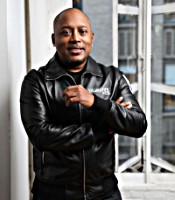 My plan initially was to go buy cars that were crashed and then buy parts to put them together. Each car cost $5,000. I was going to put it together for $10,000 and sell it for $20,000. I thought I would do that three, four, five times, boom, boom, boom, and before you know it, I would have a huge car dealership. That lasted one car.
My plan initially was to go buy cars that were crashed and then buy parts to put them together. Each car cost $5,000. I was going to put it together for $10,000 and sell it for $20,000. I thought I would do that three, four, five times, boom, boom, boom, and before you know it, I would have a huge car dealership. That lasted one car.
I also decided I was too smart to go to college. I turned around and I was broke and had no further education. I was 22 years old, working at Red Lobster. All the kids I thought were nerds in school were coming back from college and getting good jobs. I was serving them shrimp as a waiter, and I was embarrassed.
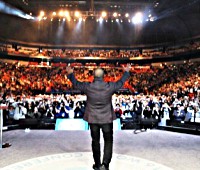 Radio Ink: So what happened?
Radio Ink: So what happened?
John: I stopped thinking I was smarter than everyone; I realized I wasn’t. I started to understand that I needed to do something I was very passionate about, and the concept of FUBU — marrying my initial passion of clothing with another passion I had, hip hop — started to fascinate me. I started to make clothes, as much as I could, out of the joy and beauty I brought to other people along with myself. I blinked my eyes, and by age 30 I would be what many people would consider a personal success.
Radio Ink: So you fail fast first. What helped you overcome thoughts that you should just get a decent job and make a decent living and stop all these crazy ideas?
John: To be honest, I failed a bunch of times at a bunch of things. I always had an entrepreneurial spirit. I can’t say I failed, because I either made a little money, but not enough, or I kept learning.
I always felt I should have a day job and that my night job, or homework, or hobby, would be the one that would bring me joy — it didn’t necessarily need to be monetarily — so that’s pretty much what kept me going. I knew I needed a base to keep the lights on and pay the bills, and then I needed a hobby that I was proud of and would keep me busy. FUBU really started off as a hobby.
(SEE THE FULL FORECAST AGENDA HERE)
Radio Ink: What challenges did you face along the way?
John: I faced so many. Partners that came and went because they couldn’t see the vision, my lack of knowledge on manufacturing, distribution, financing. I faced a lack of financial intelligence and almost lost my home. I took out a loan that was too big and didn’t understand how to utilize the money the right way. I faced people slamming the door in my face and telling me that it wouldn’t work or that it’s not what people want. I had to go back and rework it and fix it — all the same challenges I am sure other entrepreneurs face.
Radio Ink: Did you have mentors along the way?
John: My mother played a very important role in my life. She was a mentor. My stepfather came into my life when I was 16, and he taught me a massive amount about business and how to deal with people. There was a gentleman who owned a bodega in my neighborhood, and I would work there, or intern, and I would learn how he dealt with customers and inventory. My life has been a series of mentors. I consider mentors to be the number one reason people succeed.
Radio Ink: What is your advice on how broadcasters can find a mentor? How can they look for one that can help them the way mentors helped you?
John: A mentorship is a symbiotic relationship, and — like pitching anybody anything — what’s in it for the mentor? Try to find mentors that have the knowledge in a universe that you want to be in. It doesn’t mean their knowledge has to be in radio; the mentor could know how to brand, or financing, or know how to grow businesses.
And what can you do for that person, as much as what they can do for you? Make sure the mentor has no interest in your company so the information they give you is not skewed. Find a way to offer the potential mentor some value.
These days mentors don’t have to be older. A symbiotic relationship could be an 18-year-old kid who knows how to convert social media and can show you how to reach a broader market and do your analytics, or some kid who can take your iPhone and show you how to create fascinating content. I see it all the time when I go to radio stations. I see these well-known radio personalities with a bunch of kids, filming things and airing things. I’ve seen radio personalities do exactly what I’m suggesting as well.
Radio Ink: Talking about the younger generation, do you find the millennial generation is working as hard as you did? Or is their expectation that everything will be handed to them?
John: Just like in our generation, and generations before us, I find both. We have the lazy “hand it to me” millennials, and then you have other millennials whose phones are never off so you can contact them anytime. There are millennials who connect with hundreds of thousands of people, all to move toward some form of injustice they see out there, and they gather together and can overthrow governments with Twitter instead of picking up a gun. There’s always going to be both sides of the spectrum when it comes to a generation.
Radio Ink: Talk about a few people you most admire in business, and why.
John: One would be Jay Abraham. He’s my mentor. He’s managed to use his marketing prowess and his ability to see so many streams of revenue and so many ways to communicate with people, far more than I would. I would probably see three or four with each person, and he sees up to 12.
He understands the power of leveraging — and leveraging in a good way,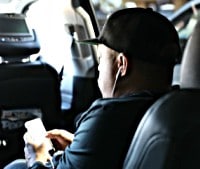 so all parties benefit. Jay is someone I sought after Shark Tank started to take off and my personal IP was becoming more of a global IP, and I needed somebody who had been there and done that and had advised many people and corporations. He was gracious enough to do that for me.
so all parties benefit. Jay is someone I sought after Shark Tank started to take off and my personal IP was becoming more of a global IP, and I needed somebody who had been there and done that and had advised many people and corporations. He was gracious enough to do that for me.
I really admire all my sharks. Robert [Herjavec] is an amazing father, but simultaneously he’s one of the world’s top cyber-theft experts and he saw where we’d be today many, many years ago. He’s grown his company; he has the wherewithal to grow a company into 200,000, 400,000 people. I find it fascinating when you grow a company over 400-500 people — to make all those people move in unison is fascinating.
Steven Spielberg has been groundbreaking in everything we have seen from him. On the flip side, I remember watching something that said he is home every night with his kids at 6 p.m. I think most of us have a work-life challenge, and he finds the time, as big as he is and as busy as he is, to be home with his kids.
Radio Ink: As a shark investor, what do you look for in the people who come before you to ask you to put your money on the line? I’m guessing it’s more than a great idea.
John: The great idea doesn’t mean anything, actually. All of us have great ideas. It’s the execution. Execution is going to come from that person, and I want to know that person has failed a couple of times prior.
That will show me a couple of things. One, they have the endurance to move forward and keep going, and two, they know the paths they shouldn’t go down and they’ve learned from it. I need to feel their excitement — that when someone is pitching you, they don’t sound like they are pitching. A good pitch is someone telling you a story about how they are moving ahead and you can hop on the train if you want to, but they are moving forward regardless and they’re excited, and it’s infectious. You both are going to win.
I’m going to be fortunate enough to invest in your dream, in a person that is smarter than me in a certain area, and hopefully you are fortunate enough that I can bring some value to you.
Also, somebody who knows their shortcomings and the resources they are going to need, not somebody who assumes. Somebody who says, “Hey, I don’t know everything. I know this, but here’s where I feel you can add value, and here are the other areas where I will need some level of assistance or resources.” Those are the people that I look for to invest in.
Radio Ink: Do the majority of Shark Tank investments succeed or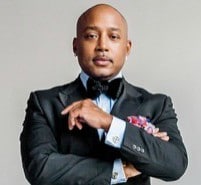 fail?
fail?
John: What I would assume is that 40 percent fail, 40 percent chug along but they don’t have rock star numbers, and 20 percent knock it out of the park. Those are good numbers. In the venture capital world, one out of 10 knocks it out of the park, and the rest die. In our world, two out of 10, three out of 10, may do really well and couple of others do OK.
That is usually because the TV element, the “Oprah effect,” gives it a good kick start. But six months to a year after the show has aired, you have to get back to business so you can keep that momentum.
Radio Ink: What was your most successful investment?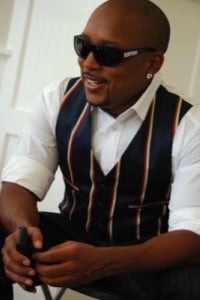
John: It’s hard to say what is the most successful. I can tell you a few of the top ones. When someone comes on and they are doing $20,000 a year in business and then you get involved and now they are doing $150,000 over the last eight consecutive years, that’s a great investment. It is a small amount of money to invest in comparison to the amount of money and reward there is.
There are other investments where it’s $250,000 and it sells for $1.5 million. There are other investments that you put a certain amount of money in, and they fail — and then bang, they catch and are skyrocketing.
Bombas Socks is a company I invested in — they give away a pair of socks to homeless shelters for every pair they sell. I think they are doing $15 million to $20 million this year. They started off at around $800,000. It is a great investment because I know that they are helping homeless people. That is a win on both sides.
Bubba’s-Q Boneless Ribs just finished a deal with Hardee’s and Carl’s Jr. where we put the rib on the actual burger. Our numbers, if everything works out the way I believe it will, will be the most successful in Shark Tank history. Three Jerks Jerky is a great company looking to be acquired by a big jerky company. AquaVault is a portable safe to put on your chair or stroller, etc. The kids who invented it were doing small numbers at the beginning. Now they’re going to do probably 30 times their initial number annually, and they will keep growing.
Radio Ink: How do we re-brand radio so it is not perceived as a 100-year-old medium?
John: I don’t want to insult anyone in radio because I see a lot of things that are amazing, and it is so easy for someone to stand outside and point their finger and say, “You guys/ girls are not doing anything over here,” when they could be wrong.
Re-branding radio would be tough. I have seen some great things with all the apps out there, the unifying of certain stations and being able to have radio on people’s portable devices. I have seen people who are creating content, like videos and talk shows people can see on their devices in small snippets.
I did notice at one time there was a lot of syndication and you would hear four top hosts all around the country. But when I am driving to and from work, I want to hear what the hell is going on in my neighborhood. And I see those shows starting to come back and do local, targeted information and content, and I’ve found that valuable. I never knew how much I missed local radio until I didn’t have local radio.
I found that empowering because, yes, I do want to know what’s going on in Houston, but today I want to know where the traffic is and construction is or what events are going on that I should be at in my market. Maybe I am too close because I go to all the stations and I see all the smart things happening — maybe I am too close to be able to say how to re-brand it at the moment.
Radio Ink: What is your overall perception of the radio industry?
John: I think, like any industry, they are facing challenges due to technology. I think, like any industry, some areas are flourishing. From the entertainment standpoint, playlists and things I am hearing are a little too general. I don’t feel like they do anything besides play the top 40.
With the markets I do find are playing something different, I find that fascinating. A Drake or Jay-Z song, after I hear it 100 times, I can either purchase it or have it on my app. I want to hear what is new and going on out there. I am asking you guys to educate me. I shouldn’t be out there running around. There are no record stores anymore, so I can’t go in a store thumbing through albums. I want to hear that from radio.
I believe your customers are someone you should empower. So does radio empower people? Morning shows can provide laughter and joy, but what other tips can I walk away with and be the smartest person at the water cooler Monday morning? How can radio give me more information to empower me and my family for my health and my day?
I love the bringing together of the annual concerts; those things are still great. I think there may be more that could be done in the community, perception-wise. A lot of times we just hear about concerts, but what else is being done in the community? I know radio stations do it; I just think they haven’t branded it well enough, the power they bring, and the unity. They bring people together.
Radio Ink: Can you give advice on how to strongly brand a product?
John: It has always been about creating a following. And once you create the following, you follow them back as much as they follow you. Do you give them some information to make them stronger? Do you listen to them, and do they feel that you care? That’s the biggest thing about selling any product.
How much more do the radio operators give to the community? How much do they listen to the community? People want to feel important. That is the most important part of selling any brand or product. People want to feel like they are part of a community, and they want to feel valued. That is the best answer I can give.
Radio Ink: Have you thought about getting into radio, doing a show or podcast?
John: I have considered doing a podcast, and I’ve hosted several shows. Nobody has stepped up to the plate and presented something that could be of value, like an entrepreneurial show. No one has had that conversation with me yet. I am open to anything. It depends on the time it will take.
Radio Ink: What keeps you motivated to be more successful every day?
John: New projects I take on because I can find a way to solve a problem. If you asked me 10 years ago, it would’ve been acquiring other brands. Five years ago, it would’ve been, “Well, I’m on Shark Tank and I am partners with all these people, and they are depending on me to help them” — and I am simultaneously learning this new way the world is converting sales and marketing through social media.
I just opened a co-working space for sharks called Blueprint + co. That’s because I realized the days of old offices, where you are locked away in the corner and not understanding what is going on with your staff or getting to see other people, are done. So I created a co-working space for fellow sharks and established companies. It is my newest adventure, and I have to be excited about what I am doing every day.
Radio Ink: Is it for the sharks on TV?
John: This is a shared co-working space for established companies that could be nationwide. For example, if you are in California and you have a staff of 100, you come to New York, you could go from place to place and do a million meetings and then go back. Or you park two people from your corporation over here, and you see Daymond John over here or Ashley Stewart over here, or the Onyx Company over here. You go over and speak to them, and you find out how you will collaborate. And you fly back to California, but your staff will still be there. It’s known that you have an operation.
It is for fellow sharks, but that could be a one-man operation or Ashley Stewart — which does $100 million in business but is based in Secaucus, NJ. The talent they want to work for them, like in marketing, maybe don’t want to be in Secaucus, so they park two or three people in New York and they collaborate with other businesses. I call everybody who has been in an established business for more than five years a fellow shark.
Radio Ink: How big is that company, and how long have you had it?
John: We opened in January. We are based on 39th and 7th Street in Manhattan. We have about 20,000 square feet. It is a vetting process, where people go and see if it works for them and their corporation or executives. They can go to blueprintandco.com.
Radio Ink: Do you plan on expanding that across the country?
John: Yes, we plan to expand to the top 10 cities that are heavily traveled by corporations and individuals.
Radio Ink: Tell us about your book.
John: My new book is called Rise and Grind. My book prior to this was The Power of Broke, and the concept of that book was that you don’t need money to become successful. You need something you and I have talked about, a strong customer base, laser-focused goals, and don’t make the mistakes I made by having a lack of financial intelligence. Once I have given the people that mindset, the concept, now I give them the exact recipe — what you do every minute of the day.
I took about 15 world-recognized or not-so-world-recognized people — some are huge actors or actresses, some are corporation people, but some are like Kyle Maynard, who with no arms or legs army-crawled Mount Kilimanjaro. I want to know the discipline these people have. I interviewed them, and I learned what they do the first 90 minutes of the day and the last 90 minutes of the day. How do they treat their customers? How did they get where they are, and what did they learn early in life that they are still applying today — and what did they learn early on that they forgot, or hurt them, and they had to revisit it? And how you can relate to all of it.
You will notice in there, no matter how somebody positions it, every single one has some way of creating a goal. You will see that everybody has a trait: They follow through. People reading this will say, “I am doing the right thing,” or, “I never tried this.” That is the rise and grind. Everyone has to rise, but we don’t all have grind.
Radio Ink: What did you get out of putting the book together?
John: The first things I should do earlier in the day, and the things I had been doing wrong, and some things I should actually try to do because I hadn’t been doing them. It reminded me of some things I used to do and no longer do and should get back to. It reinforced a lot of things, and some things I learned as total new education.
Radio Ink: Our magazine is read by the CEO of every major radio company. What would you like to say to them? And what will you say in a couple of weeks in New York?
John: I will say, over the course of my time there, I am going to be taking in more data from the people I meet in radio. I have no idea what I am going to say, because some of the questions you asked me gave me some thought-provoking things to go and ask the people I know in radio.
A lot of people are afraid of the changes happening now, but change is always happening. Radio probably has the strongest hold, even though people are thinking, “Oh, we look old.” Listen, you want to talk about looking old, try the fashion industry. You made a sweater last year, it’s already old as far as people are concerned.
I think radio has an extremely strong following and a very powerful voice, and they are influential. They get to people where nobody else can get to them. They get to them when they are happy or sad, in their cars in the morning, late at night. I think radio should understand the power they have. They are very geo-targeted. They bring people joy and vital information, and I think they shouldn’t be too hard on themselves.
That being said, they shouldn’t be lazy and say, “We’re gonna be around forever.” What are the best practices in other fields that are similar to radio — content providers branding things — that radio could use for themselves? I think more people could do a better job at that; they should be retaining this information from the people they are selling to and talking to and getting more information on how to get better.
They need to capture more analytics and data to understand the value they have and that they are not dinosaurs. They can maximize that value and content and those connections they have.
Radio Ink: What is your favorite radio station and morning show?
John: That’s tough because I am in so many different cities. I really love Z100, 107.5 [WBLS], 106.7 [WLTW] in New York. I love Delilah — she is amazing. I love Sway, and Ed Lover and Monie Love out of Atlanta are amazing. Big Boy. Steve Harvey. Tom Joyner and Elvis Duran.





